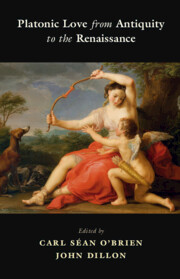Book contents
- Platonic Love from Antiquity to the Renaissance
- Platonic Love from Antiquity to the Renaissance
- Copyright page
- Contents
- Acknowledgements
- Notes on Contributors
- Introduction
- Part I Love in Plato
- Part II Development of Platonic Love in Antiquity
- Part III Love and Metaphysics during the Middle Ages
- Chapter 9 Divine Love and Platonic Beauty in Dionysius the Areopagite
- Chapter 10 Love in the Thought of John Scotus Eriugena
- Chapter 11 Thomas Aquinas on the Connatural, the Supernatural, Love and Charity
- Part IV Platonic Love during the Renaissance
- Bibliography
- Subject Index
- Index Locorum
Chapter 9 - Divine Love and Platonic Beauty in Dionysius the Areopagite
from Part III - Love and Metaphysics during the Middle Ages
Published online by Cambridge University Press: 25 August 2022
- Platonic Love from Antiquity to the Renaissance
- Platonic Love from Antiquity to the Renaissance
- Copyright page
- Contents
- Acknowledgements
- Notes on Contributors
- Introduction
- Part I Love in Plato
- Part II Development of Platonic Love in Antiquity
- Part III Love and Metaphysics during the Middle Ages
- Chapter 9 Divine Love and Platonic Beauty in Dionysius the Areopagite
- Chapter 10 Love in the Thought of John Scotus Eriugena
- Chapter 11 Thomas Aquinas on the Connatural, the Supernatural, Love and Charity
- Part IV Platonic Love during the Renaissance
- Bibliography
- Subject Index
- Index Locorum
Summary
Dionysius endorses the Platonic position that love is a human response to beauty, and furthermore that the human quest for contemplation involves purification both of our understanding of beauty and of our experience of love. Dionysius’ understanding of both beauty and love goes beyond what we find in Plato; some of these changes belong to the development of the Platonic tradition, and especially to Plotinus, others to the Christian tradition. In the former case, beauty is understood less in terms of symmetry and more in terms of transparency to higher realities. This leads in Dionysius to a sense of beauty being a means of Theophany: God is manifest as beauty cascading through the different ontological levels of being. It is, however, crucial for Dionysius that this manifestation of beauty is seen in the way in which God’s love for all that exists is communicated through the ranks of being; this dimension he owes to his own Christian tradition. This enables Dionysius to integrate this understanding of being drawn to God through beauty with his understanding of the Church, both celestial and earthly, as essentially hierarchical, in which purification is experienced through participation in the rites of the Church.
- Type
- Chapter
- Information
- Platonic Love from Antiquity to the Renaissance , pp. 153 - 170Publisher: Cambridge University PressPrint publication year: 2022

